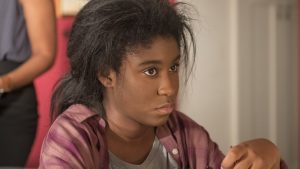by Laura Pitts
Foster Care Adoption Program Manager
My one guilty pleasure? Television.
Binge-watching Parks and Rec for the 10th time? Guilty. Waiting eagerly all week for a new episode of Game of Thrones to air? Guilty. Jumping on the Facebook page for The Walking Dead minutes after a new episode to find out what the other viewers think? Guilty. Shaking my head at the crazy people on reality shows? So guilty.
Occasionally, a show will address the topic of foster care or older child adoption. I’ve seen it on family dramas like Parenthood or The Fosters, and I’ve see it on popular comedies like Modern Family. The more I watch, the more I find examples of TV characters opening their homes to foster or adopt. I admit, I usually feel a mixture of nerves and excitement to see how the show will approach this important, sensitive, and nuanced topic. Usually, the story arc lasts an episode or two, and then things return to “normal.” Usually, things don’t get too deep. Sometimes, the show gets it really wrong for the sake of drama.
I promise, the real thing has enough drama — the happy tears and the heart-broken ones.

Most recently, a highly popular primetime show, This Is Us, began a storyline involving a family’s decision to become foster parents. As the show had already honestly and movingly tackled the topic of an infant transracial adoption as well as a birth parent reunion, I felt pretty confident that the writers could handle this with grace. I was also nervous – would the storyline be too sweet? Too easy? Would the foster youth be portrayed as a delinquent? Violent?
More importantly — what would the host of viewers think about foster care after watching?
Weekly, I watched as the Pearson family went through the home study process. Dad had some self-doubts about whether he could parent a hurt child. Mom was the “dragger” who carried them along with the belief that they can do this. Together, they worried about the impact it will have on their biological daughters. Adorably, they jumped every time the phone rang. Nerves. Excitement.
A few episodes ago, they became foster parents to a 12-year-old girl named Deja. When she is dropped off that evening, the Pearsons feel at a loss for what to do. The acting is strong – I could feel their anxiety, their desire to do this “right,” their compassion, the lumps in their throats. Before the social worker leaves, Dad says: “Deja doesn’t seem OK.” The social worker responds: “That is correct. She is definitely not OK. She just got yanked out of her family and plopped down with a bunch of strangers.”
I could have hugged the T.V.
YES. YES! Entering foster care is traumatic, and scary, and it is NOT the young person’s fault. This is a myth that we bust every day. Foster youth are not bad, and they are not juvenile delinquents. They enter the system because their caretakers couldn’t keep them safe. Foster parents are not saviors, and foster kids are not “happy” to be there. It is hard. There is loss.
The next episode I spot Dad reading the book Wounded Children, Healing Homes. YES! That’s one of our required reading books for our families. Someone is doing their research.

 As the show goes on, Deja struggles to trust her foster parents, even though you can tell she likes them. Dad struggles to bond with her and has awkward car rides where she won’t respond to any of his comments. Occasionally, Deja lets them in a bit, shares something personal. She has hygiene issues. She has self-esteem issues. She has PTSD. She hurts on the inside, and sometimes she lashes out. She is precious and strong and resilient. She smiles. She LOVES her mom and worries if she is okay. It is HARD.
As the show goes on, Deja struggles to trust her foster parents, even though you can tell she likes them. Dad struggles to bond with her and has awkward car rides where she won’t respond to any of his comments. Occasionally, Deja lets them in a bit, shares something personal. She has hygiene issues. She has self-esteem issues. She has PTSD. She hurts on the inside, and sometimes she lashes out. She is precious and strong and resilient. She smiles. She LOVES her mom and worries if she is okay. It is HARD.
I read comments online from viewers who “don’t like” Deja because she seems like “trouble,” or who worry that she will “ruin the Pearson’s lives.” Ouch. I hope they will keep watching with an open mind.
I don’t know how the story will continue to unfold or if it will retain elements of truth surrounding the emotional highs and lows that accompany this journey. For now, I hope that lots of people are watching, learning, and finding not admiration, but understanding for foster-adopt families and youth. I hope that on-screen honesty will lead to off-screen family discussions, adoption considerations, phone calls, and willingness to be a part of the community that can heal brokenness.
My agency, Children’s Home Society of Virginia, is like many around the country. We need families willing to adopt older kids and teens (age 12+). Especially those who are slow to trust, quick to react, and often hard to parent. More than 700 young people are waiting in Virginia. They have experienced life events that no child should have to experience.
They are also precious, strong, and resilient like Deja.
November is National Adoption Month. Think about what you can do, today or in the future. We need families for teens, and we need your support.
